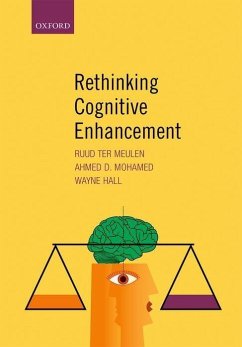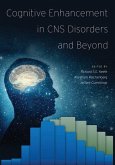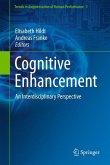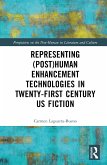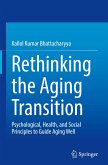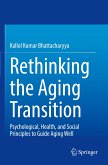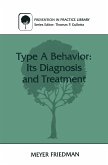Rethinking Cognitive Enhancement
Herausgeber: Ter Meulen, Ruud; Hall, Wayne; Mohammed, Ahmed
Rethinking Cognitive Enhancement
Herausgeber: Ter Meulen, Ruud; Hall, Wayne; Mohammed, Ahmed
- Gebundenes Buch
- Merkliste
- Auf die Merkliste
- Bewerten Bewerten
- Teilen
- Produkt teilen
- Produkterinnerung
- Produkterinnerung
This book critically explores and analyses the scientific and ethical debates surrounding cognitive enhancers. Including contributions from neuroscientists, neuropsychopharmacologists, ethicists, philosophers, public health professionals, and policy researchers, the book offers a multidisciplinary, critical consideration of this topic.
Andere Kunden interessierten sich auch für
![Cognitive Enhancement in CNS Disorders and Beyond Cognitive Enhancement in CNS Disorders and Beyond]() Cognitive Enhancement in CNS Disorders and Beyond149,99 €
Cognitive Enhancement in CNS Disorders and Beyond149,99 €![Rethinking Risk Assessment Rethinking Risk Assessment]() John MonahanRethinking Risk Assessment93,99 €
John MonahanRethinking Risk Assessment93,99 €![Cognitive Enhancement Cognitive Enhancement]() Cognitive Enhancement110,99 €
Cognitive Enhancement110,99 €![Representing (Post)Human Enhancement Technologies in Twenty-First Century US Fiction Representing (Post)Human Enhancement Technologies in Twenty-First Century US Fiction]() Carmen Laguarta-BuenoRepresenting (Post)Human Enhancement Technologies in Twenty-First Century US Fiction190,99 €
Carmen Laguarta-BuenoRepresenting (Post)Human Enhancement Technologies in Twenty-First Century US Fiction190,99 €![Rethinking the Aging Transition Rethinking the Aging Transition]() Kallol Kumar BhattacharyyaRethinking the Aging Transition63,99 €
Kallol Kumar BhattacharyyaRethinking the Aging Transition63,99 €![Rethinking the Aging Transition Rethinking the Aging Transition]() Kallol Kumar BhattacharyyaRethinking the Aging Transition44,99 €
Kallol Kumar BhattacharyyaRethinking the Aging Transition44,99 €![Type A Behavior: Its Diagnosis and Treatment Type A Behavior: Its Diagnosis and Treatment]() Meyer FriedmanType A Behavior: Its Diagnosis and Treatment39,99 €
Meyer FriedmanType A Behavior: Its Diagnosis and Treatment39,99 €-
-
-
This book critically explores and analyses the scientific and ethical debates surrounding cognitive enhancers. Including contributions from neuroscientists, neuropsychopharmacologists, ethicists, philosophers, public health professionals, and policy researchers, the book offers a multidisciplinary, critical consideration of this topic.
Produktdetails
- Produktdetails
- Verlag: Oxford University Press, USA
- Seitenzahl: 336
- Erscheinungstermin: 1. Mai 2017
- Englisch
- Abmessung: 249mm x 173mm x 23mm
- Gewicht: 748g
- ISBN-13: 9780198727392
- ISBN-10: 0198727399
- Artikelnr.: 48377582
- Verlag: Oxford University Press, USA
- Seitenzahl: 336
- Erscheinungstermin: 1. Mai 2017
- Englisch
- Abmessung: 249mm x 173mm x 23mm
- Gewicht: 748g
- ISBN-13: 9780198727392
- ISBN-10: 0198727399
- Artikelnr.: 48377582
Professor Ruud ter Meulen (1952) is psychologist and ethicist. He was Professor and Director at the Institute for Bioethics and the University of Maastricht in the Netherlands. In 2005 he was appointed Chair for Ethics of Medicine and Director of the Centre for ethics in Medicine at the University of Bristol. He has directed a range of European projects in the field of biomedical ethics. He was co-ordinator of the ENHANCE project, dealing with the ethical, philosophical and social issues of enhancement technologies. He was also co-ordinator of the recently finished European EPOCH project on the role of ethics in public policy-making on new biotechnologies, with enhancement as a case, and of the European SYBHEL project on the ethical, legal and social issues of synthetic biology as applied to human health. He has published about 150 articles, book chapters and edited volumes on a range of topics in bioethics. Wayne Hall is a Professor and Director of the Centre for Youth Substance Abuse Research at the University of Queensland. He was formerly: an NHMRC Australia Fellow in addiction neuroethics at the University of Queensland Centre for Clinical Research and the University of Queensland Brain Institute (2009-2014); Professor of Public Health Policy, School of Population Health, UQ (2005-2009); Director of the Office of Public Policy and Ethics at the Institute for Molecular Bioscience (2001-2005) at the University of Queensland; and Director of the National Drug and Alcohol Research Centre, UNSW (1994-2001). He has advised the World Health Organization on: the health effects of cannabis use; the effectiveness of drug substitution treatment; the contribution of illicit drug use to the global burden of disease; and the ethical implications of genetic and neuroscience research on addiction. Dr Ahmed Dahir Mohamed is a registered psychologist, neuroscientist and author. He was the recipient of the Emerging Psychologist Award from the 2016 International Congress of Psychology in Yokohama, Japan for his work on the effects of mindfulness in young people. He was formerly a post-doctoral fellow in Developmental Cognitive and Affective Neuroscience at the School of Psychology University of Nottingham Malaysia Campus. He obtained his doctorate in Psychology from the University of Cambridge, where the focus of his thesis was how to enhance cognition in young people. Dr. Mohamed was a recognized DPhil student at the Oxford Centre for Neuroethics, University of Oxford. In 2013, he was a visiting neuroscience and ethics fellow at St Cross College, University of Oxford. Dr. Mohamed holds a first class honours degree in psychology from the University of Reading and he became a full chartered member of the British Psychological Society in 2013 and elected associate fellow in 2015.
* Preface
* Editorial
* List of Contributors
* Part I: Introduction to the Volume
* 1: Ruud ter Meulen, Ahmed Mohammed, and Wayne Hall: Should we get
smarter by taking cognitive drugs? Towards a critical appraisal of
arguments and evidence in the debate on cognitive enhancement
* 2: Ruud ter Meulen: The ethical debate on human enhancement and
cognitive enhancement by way of biotechnologies
* Part II: Risk and benefits of the use of neuropharmacological drugs
for cognitive enhancement
* 3: Reinoud de Jongh: Overclocking the brain? The potential and
limitations of Cognition-Enhancing Drugs
* 4: Charles Massie, Eric Yamga, and Brendon Boot: Neuro-enhancement: a
call for better evidence on safety and efficacy
* 5: Andreas Heinz and Sabine Müller: Exaggerating benefits and
downplaying risks in the debate on cognitive neuroenhancement
* 6: Ahmed Mohammed: The Effects of Modafinil on Creativity: Results
from a Randomized Controlled Trial
* 7: Ahmed Mohammed: Does modafinil improve cognitive functioning in
healthy individuals?
* 8: Priyanka P. Shah-Basak and Roy H. Hamilton: Cognitive enhancement
using noninvasive brain stimulation: weighing opportunity,
feasibility, and risk
* 9: Mark Attiah: The use of brain stimulation technology for cognitive
enhancement and the potential for addiction
* 10: Stephan Schleim and Boris B. Quednow: Debunking the ethical
neuroenhancement debate
* Part III: Ethical, philosophical, legal and policy issues of
cognitive enhancement
* 11: Ralph Hertwig and Thomas Hills: The evolutionary limits of
enhancement
* 12: Alex McKeown: Enhancement and therapy: is it possible to draw a
line?
* 13: Maartje Schermer: On the argument that enhancement is cheating
* 14: Dan Stein: Psychiatric nosology and cognitive enhancement
* 15: Heather Bradshaw-Martin: Will cognitive enhancement lead to more
well-being? The case of people with disabilities
* 16: Imogen Goold: The Legal Aspects of Cognitive Enhancement Legal
regulations on cognitive enhancement practices
* 17: Brad Partridge: Students and 'smart drugs': empirical research
can shed light on enhancement enthusiasm
* 18: Stephanie Bell, Jayne Lucke and Wayne Hall: Lessons for
enhancement form the history of cocaine and amphetamine use
* 19: Wayne Hall and John Strang: Drug policy and the public good:
evidence for effective interventions
* Editorial
* List of Contributors
* Part I: Introduction to the Volume
* 1: Ruud ter Meulen, Ahmed Mohammed, and Wayne Hall: Should we get
smarter by taking cognitive drugs? Towards a critical appraisal of
arguments and evidence in the debate on cognitive enhancement
* 2: Ruud ter Meulen: The ethical debate on human enhancement and
cognitive enhancement by way of biotechnologies
* Part II: Risk and benefits of the use of neuropharmacological drugs
for cognitive enhancement
* 3: Reinoud de Jongh: Overclocking the brain? The potential and
limitations of Cognition-Enhancing Drugs
* 4: Charles Massie, Eric Yamga, and Brendon Boot: Neuro-enhancement: a
call for better evidence on safety and efficacy
* 5: Andreas Heinz and Sabine Müller: Exaggerating benefits and
downplaying risks in the debate on cognitive neuroenhancement
* 6: Ahmed Mohammed: The Effects of Modafinil on Creativity: Results
from a Randomized Controlled Trial
* 7: Ahmed Mohammed: Does modafinil improve cognitive functioning in
healthy individuals?
* 8: Priyanka P. Shah-Basak and Roy H. Hamilton: Cognitive enhancement
using noninvasive brain stimulation: weighing opportunity,
feasibility, and risk
* 9: Mark Attiah: The use of brain stimulation technology for cognitive
enhancement and the potential for addiction
* 10: Stephan Schleim and Boris B. Quednow: Debunking the ethical
neuroenhancement debate
* Part III: Ethical, philosophical, legal and policy issues of
cognitive enhancement
* 11: Ralph Hertwig and Thomas Hills: The evolutionary limits of
enhancement
* 12: Alex McKeown: Enhancement and therapy: is it possible to draw a
line?
* 13: Maartje Schermer: On the argument that enhancement is cheating
* 14: Dan Stein: Psychiatric nosology and cognitive enhancement
* 15: Heather Bradshaw-Martin: Will cognitive enhancement lead to more
well-being? The case of people with disabilities
* 16: Imogen Goold: The Legal Aspects of Cognitive Enhancement Legal
regulations on cognitive enhancement practices
* 17: Brad Partridge: Students and 'smart drugs': empirical research
can shed light on enhancement enthusiasm
* 18: Stephanie Bell, Jayne Lucke and Wayne Hall: Lessons for
enhancement form the history of cocaine and amphetamine use
* 19: Wayne Hall and John Strang: Drug policy and the public good:
evidence for effective interventions
* Preface
* Editorial
* List of Contributors
* Part I: Introduction to the Volume
* 1: Ruud ter Meulen, Ahmed Mohammed, and Wayne Hall: Should we get
smarter by taking cognitive drugs? Towards a critical appraisal of
arguments and evidence in the debate on cognitive enhancement
* 2: Ruud ter Meulen: The ethical debate on human enhancement and
cognitive enhancement by way of biotechnologies
* Part II: Risk and benefits of the use of neuropharmacological drugs
for cognitive enhancement
* 3: Reinoud de Jongh: Overclocking the brain? The potential and
limitations of Cognition-Enhancing Drugs
* 4: Charles Massie, Eric Yamga, and Brendon Boot: Neuro-enhancement: a
call for better evidence on safety and efficacy
* 5: Andreas Heinz and Sabine Müller: Exaggerating benefits and
downplaying risks in the debate on cognitive neuroenhancement
* 6: Ahmed Mohammed: The Effects of Modafinil on Creativity: Results
from a Randomized Controlled Trial
* 7: Ahmed Mohammed: Does modafinil improve cognitive functioning in
healthy individuals?
* 8: Priyanka P. Shah-Basak and Roy H. Hamilton: Cognitive enhancement
using noninvasive brain stimulation: weighing opportunity,
feasibility, and risk
* 9: Mark Attiah: The use of brain stimulation technology for cognitive
enhancement and the potential for addiction
* 10: Stephan Schleim and Boris B. Quednow: Debunking the ethical
neuroenhancement debate
* Part III: Ethical, philosophical, legal and policy issues of
cognitive enhancement
* 11: Ralph Hertwig and Thomas Hills: The evolutionary limits of
enhancement
* 12: Alex McKeown: Enhancement and therapy: is it possible to draw a
line?
* 13: Maartje Schermer: On the argument that enhancement is cheating
* 14: Dan Stein: Psychiatric nosology and cognitive enhancement
* 15: Heather Bradshaw-Martin: Will cognitive enhancement lead to more
well-being? The case of people with disabilities
* 16: Imogen Goold: The Legal Aspects of Cognitive Enhancement Legal
regulations on cognitive enhancement practices
* 17: Brad Partridge: Students and 'smart drugs': empirical research
can shed light on enhancement enthusiasm
* 18: Stephanie Bell, Jayne Lucke and Wayne Hall: Lessons for
enhancement form the history of cocaine and amphetamine use
* 19: Wayne Hall and John Strang: Drug policy and the public good:
evidence for effective interventions
* Editorial
* List of Contributors
* Part I: Introduction to the Volume
* 1: Ruud ter Meulen, Ahmed Mohammed, and Wayne Hall: Should we get
smarter by taking cognitive drugs? Towards a critical appraisal of
arguments and evidence in the debate on cognitive enhancement
* 2: Ruud ter Meulen: The ethical debate on human enhancement and
cognitive enhancement by way of biotechnologies
* Part II: Risk and benefits of the use of neuropharmacological drugs
for cognitive enhancement
* 3: Reinoud de Jongh: Overclocking the brain? The potential and
limitations of Cognition-Enhancing Drugs
* 4: Charles Massie, Eric Yamga, and Brendon Boot: Neuro-enhancement: a
call for better evidence on safety and efficacy
* 5: Andreas Heinz and Sabine Müller: Exaggerating benefits and
downplaying risks in the debate on cognitive neuroenhancement
* 6: Ahmed Mohammed: The Effects of Modafinil on Creativity: Results
from a Randomized Controlled Trial
* 7: Ahmed Mohammed: Does modafinil improve cognitive functioning in
healthy individuals?
* 8: Priyanka P. Shah-Basak and Roy H. Hamilton: Cognitive enhancement
using noninvasive brain stimulation: weighing opportunity,
feasibility, and risk
* 9: Mark Attiah: The use of brain stimulation technology for cognitive
enhancement and the potential for addiction
* 10: Stephan Schleim and Boris B. Quednow: Debunking the ethical
neuroenhancement debate
* Part III: Ethical, philosophical, legal and policy issues of
cognitive enhancement
* 11: Ralph Hertwig and Thomas Hills: The evolutionary limits of
enhancement
* 12: Alex McKeown: Enhancement and therapy: is it possible to draw a
line?
* 13: Maartje Schermer: On the argument that enhancement is cheating
* 14: Dan Stein: Psychiatric nosology and cognitive enhancement
* 15: Heather Bradshaw-Martin: Will cognitive enhancement lead to more
well-being? The case of people with disabilities
* 16: Imogen Goold: The Legal Aspects of Cognitive Enhancement Legal
regulations on cognitive enhancement practices
* 17: Brad Partridge: Students and 'smart drugs': empirical research
can shed light on enhancement enthusiasm
* 18: Stephanie Bell, Jayne Lucke and Wayne Hall: Lessons for
enhancement form the history of cocaine and amphetamine use
* 19: Wayne Hall and John Strang: Drug policy and the public good:
evidence for effective interventions

